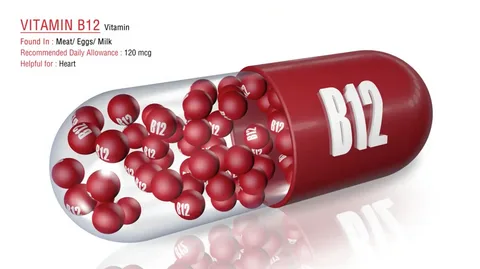Vitamin B12, also known as cobalamin, is a vital nutrient that plays a crucial role in various bodily functions, including DNA synthesis, neurological function, and, notably, red blood cell (RBC) production. Understanding how this vitamin contributes to the formation and maintenance of RBCs can provide insights into its importance for overall health and wellbeing.
Understanding Red Blood Cells
What Are Red Blood Cells?
Red blood cells are the most common type of blood cell in the human body. Their primary function is to carry oxygen from the lungs to the rest of the body and return carbon dioxide from the tissues back to the lungs. This process is vital for maintaining the body’s energy levels and overall cellular function.
The Lifespan and Function of Red Blood Cells
Red blood cells have a lifespan of about 120 days. They are produced in the bone marrow through a process called erythropoiesis. Mature RBCs are characterized by their biconcave shape, which increases their surface area for gas exchange. Hemoglobin, the protein that binds oxygen, is a key component of RBCs.
The Importance of Vitamin B12
What is Vitamin B12?
Vitamin B12 is a water-soluble vitamin that is naturally found in animal products such as meat, fish, poultry, eggs, and dairy. It can also be obtained through fortified foods and supplements. This vitamin is essential for maintaining healthy nerve cells, producing DNA and RNA, and synthesizing red blood cells.
How Does Vitamin B12 Affect Red Blood Cell Production?
Vitamin B12 is crucial for the formation of RBCs. It works in conjunction with folate (vitamin B9) to ensure proper DNA synthesis during the development of red blood cells in the bone marrow. A deficiency in vitamin B12 can lead to impaired DNA synthesis, resulting in the production of abnormally large and dysfunctional red blood cells, a condition known as megaloblastic anemia.
The Biochemical Role of Vitamin B12 in RBC Production
DNA Synthesis and Cell Division
For red blood cells to mature properly, DNA synthesis must occur without error. Vitamin B12 serves as a cofactor for the enzyme methionine synthase, which is involved in the conversion of homocysteine to methionine. This reaction is critical for the formation of tetrahydrofolate, a form of folate required for DNA synthesis and cell division. Without sufficient B12, DNA replication is disrupted, leading to the production of oversized and ineffective RBCs.
Hemoglobin Production
Vitamin B12 is also essential for the synthesis of hemoglobin. Adequate hemoglobin levels are necessary for the efficient transport of oxygen throughout the body. When B12 levels are insufficient, hemoglobin production can be compromised, leading to symptoms of anemia such as fatigue, weakness, and shortness of breath.
Causes and Symptoms of Vitamin B12 Deficiency
Causes of Deficiency
Several factors can contribute to vitamin B12 deficiency, including:
- Dietary Insufficiency: Vegans and vegetarians are at a higher risk of deficiency since B12 is primarily found in animal products.
- Malabsorption: Conditions like pernicious anemia, celiac disease, and Crohn’s disease can impair the absorption of B12 in the gut.
- Medications: Certain medications, such as proton pump inhibitors and metformin, can interfere with B12 absorption.
- Age: Older adults may have decreased stomach acid production, which is necessary for B12 absorption from food.
Symptoms of Deficiency
Vitamin B12 deficiency can manifest in various ways, including:
- Fatigue and weakness
- Pale or jaundiced skin
- Heart palpitations and shortness of breath
- Neurological symptoms such as numbness, tingling, and difficulty walking
- Cognitive disturbances, including memory loss and difficulty concentrating
Diagnosing and Treating Vitamin B12 Deficiency
Diagnosis
Diagnosing a vitamin B12 deficiency typically involves a combination of medical history, physical examination, and laboratory tests. Blood tests to measure B12 levels, complete blood count (CBC), and the presence of megaloblastic anemia are standard diagnostic tools. Elevated levels of homocysteine and methylmalonic acid (MMA) can also indicate a B12 deficiency.
Treatment Options
Treatment for vitamin B12 deficiency depends on the underlying cause and the severity of the deficiency. Options include:
- Dietary Changes: Increasing the intake of B12-rich foods such as meat, fish, poultry, eggs, and dairy products.
- Oral Supplements: Vitamin B12 supplements in the form of tablets or capsules.
- Injections: Intramuscular injections of vitamin B12 for individuals with severe deficiency or malabsorption issues.
- Sublingual Supplements: B12 supplements that dissolve under the tongue for enhanced absorption.
Preventing Vitamin B12 Deficiency
Dietary Recommendations
To prevent vitamin B12 deficiency, it is essential to consume adequate amounts of this vitamin through a balanced diet. The recommended dietary allowance (RDA) for vitamin B12 varies by age, sex, and life stage:
- Adults: 2.4 micrograms per day
- Pregnant women: 2.6 micrograms per day
- Breastfeeding women: 2.8 micrograms per day
Fortified Foods and Supplements
For individuals at risk of deficiency, fortified foods and supplements can provide a reliable source of vitamin B12. Common fortified foods include breakfast cereals, nutritional yeast, and plant-based milk alternatives.
The Broader Health Implications of Vitamin B12
Neurological Health
Vitamin B12 is essential for maintaining the health of the nervous system. It helps produce myelin, the protective covering of nerves, and supports neurotransmitter function. Deficiency can lead to neurological symptoms such as numbness, tingling, balance issues, and cognitive impairments.
Cardiovascular Health
Adequate vitamin B12 levels are associated with a lower risk of cardiovascular disease. By converting homocysteine to methionine, B12 helps reduce homocysteine levels in the blood, which is a known risk factor for cardiovascular diseases such as heart disease and stroke.
Overall Wellbeing
Maintaining sufficient levels of vitamin B12 is vital for overall health and wellbeing. It supports energy production, cognitive function, and the formation of red blood cells, all of which contribute to a healthy and active lifestyle.
FAQs About Vitamin B12 and Red Blood Cell Production
What foods are the best sources of vitamin B12?
The best sources of vitamin B12 include animal products such as meat, fish, poultry, eggs, and dairy. Fortified foods like cereals and plant-based milk alternatives can also provide B12, especially for those following a vegan or vegetarian diet.
Can vitamin B12 deficiency cause anemia?
Yes, vitamin B12 deficiency can cause megaloblastic anemia, characterized by the production of abnormally large and dysfunctional red blood cells. This condition can lead to symptoms such as fatigue, weakness, and shortness of breath.
How is vitamin B12 absorbed in the body?
Vitamin B12 is absorbed in the small intestine. It requires the presence of intrinsic factor, a protein produced in the stomach, to be absorbed efficiently. Conditions that affect the production of intrinsic factor or the health of the small intestine can impair B12 absorption.
Who is at risk of vitamin B12 deficiency?
People at risk of vitamin B12 deficiency include vegans and vegetarians, older adults, individuals with gastrointestinal disorders such as celiac disease and Crohn’s disease, and those taking certain medications that affect B12 absorption.
How can I increase my vitamin B12 intake if I am a vegetarian?
Vegetarians can increase their vitamin B12 intake by consuming fortified foods such as breakfast cereals, nutritional yeast, and plant-based milk alternatives. B12 supplements are also a reliable source for those who do not consume animal products.
What are the symptoms of vitamin B12 deficiency?
Symptoms of vitamin B12 deficiency include fatigue, weakness, pale or jaundiced skin, heart palpitations, shortness of breath, neurological symptoms (numbness, tingling, difficulty walking), and cognitive disturbances (memory loss, difficulty concentrating).
How is vitamin B12 deficiency diagnosed?
Vitamin B12 deficiency is diagnosed through a combination of medical history, physical examination, and blood tests to measure B12 levels, complete blood count (CBC), and the presence of megaloblastic anemia. Elevated homocysteine and methylmalonic acid (MMA) levels can also indicate a deficiency.
Can vitamin B12 supplements improve red blood cell production?
Yes, vitamin B12 supplements can improve red blood cell production in individuals with a deficiency. Supplementation helps restore normal B12 levels, supporting DNA synthesis and the production of healthy red blood cells.
Are there any side effects of taking too much vitamin B12?
Vitamin B12 is generally considered safe, and no upper limit for B12 intake has been established. Excess B12 is excreted in the urine. However, high doses of B12 supplements should be taken under medical supervision, especially for individuals with certain health conditions.
How can I maintain adequate vitamin B12 levels?
To maintain adequate vitamin B12 levels, consume a balanced diet that includes B12-rich foods, consider fortified foods or supplements if you have dietary restrictions, and have regular check-ups to monitor your B12 status, especially if you are at risk of deficiency.
Conclusion
Vitamin B12 plays a vital role in red blood cell production, ensuring the proper formation and function of these crucial cells. Understanding the importance of B12, recognizing the signs of deficiency, and taking steps to maintain adequate levels can significantly impact overall health and wellbeing. Whether through diet, fortified foods, or supplements, ensuring sufficient B12 intake is essential for everyone, particularly those at risk of deficiency.



